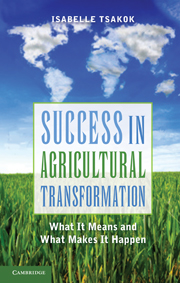Crossref Citations
This Book has been
cited by the following publications. This list is generated based on data provided by Crossref.
Briones, Roehlano
and
Felipe, Jesus
2013.
Agriculture and Structural Transformation in Developing Asia: Review and Outlook.
SSRN Electronic Journal,
Kjaer, Anne Mette
2014.
From ‘Good’ to ‘Growth-Enhancing’ Governance: Emerging Research Agendas on Africaʼs Political-Economy.
Governance in Africa,
Vol. 1,
Issue. 1,
p.
2.
Rodrigues Vieira, Vinícius
2014.
Public and private: change and continuity in economy through two meta-fields in society.
Cambridge Review of International Affairs,
Vol. 27,
Issue. 1,
p.
21.
Rapsomanikis, George
2015.
Small Farms Big Picture: Smallholder agriculture and structural transformation.
Development,
Vol. 58,
Issue. 2-3,
p.
242.
Minten, Bart
Tamru, Seneshaw
Engida, Ermias
and
Kuma, Tadesse
2016.
Transforming Staple Food Value Chains in Africa: The Case of Teff in Ethiopia.
The Journal of Development Studies,
Vol. 52,
Issue. 5,
p.
627.
Nassirou Ba, Mahamadou
2016.
Strategic Agricultural Commodity Value Chains in Africa for Increased Food: The Regional Approach for Food Security.
Agricultural Sciences,
Vol. 07,
Issue. 09,
p.
549.
Abdallah, Souleymane
El-Helepi, Medhat
Konde, Victor
and
Pesce, Ottavia
2017.
Macroeconomic Policy Framework for Africa's Structural Transformation.
p.
217.
Berkson, William
2017.
Encouraging Openness.
Vol. 325,
Issue. ,
p.
207.
Lopes, Carlos
2019.
Africa in Transformation.
p.
83.
Sun, Lei
2020.
Economic Growth and Development.
p.
157.
Sun, Lei
2020.
Economic Growth and Development.
p.
1.
Sulifoa, Stephanie Ramona O’Connor
and
Cox, Linda J.
2020.
Participatory Research and Planning in Practice.
p.
133.
Sun, Lei
2020.
Economic Growth and Development.
p.
123.
Wardhono, Adhitya
Wibowo, Rudi
Rondhi, M.
and
Addy, H.S.
2020.
Institutional Arrangement of Agriculture Development in Indonesia: Lesson Learn from Korea through 6th Order of Industrial Agriculture System.
E3S Web of Conferences,
Vol. 142,
Issue. ,
p.
05004.
Tadele, Esubalew
and
Hibistu, Tewabe
2021.
Empirical review on the use dynamics and economics of teff in Ethiopia.
Agriculture & Food Security,
Vol. 10,
Issue. 1,
Tadele, Esubalew
Hibistu, Tewabe
and
Ercolano, Salvatore
2022.
Spatial production distribution, economic viability and value chain features of teff in Ethiopia: Systematic review.
Cogent Economics & Finance,
Vol. 10,
Issue. 1,
Rohne Till, Emelie
2022.
Agriculture for Economic Development in Africa.
p.
9.
Võ, Thành Danh
Trần, Văn Hiếu
Phan, Đình Khôi
Huỳnh, Việt Khải
Lê, Nguyễn Đoan Khôi
Phạm, Văn Búa
Phan, Văn Phúc
and
Nguyễn, Thị Lương
2022.
Thực trạng công nghiệp hóa, hiện đại hóa nông nghiệp, nông thôn ở việt nam và Đồng bằng sông Cửu Long.
Can Tho University Journal of Science,
Vol. 58,
Issue. SDMD,
p.
191.
Rohne Till, Emelie
2022.
Agriculture for Economic Development in Africa.
p.
19.
Oluwole, Oluwatoyin
Ibidapo, Olubunmi
Arowosola, Temiloluwa
Raji, Fatima
Zandonadi, Renata Puppin
Alasqah, Ibrahim
Lho, Linda Heejung
Han, Heesup
and
Raposo, António
2023.
Sustainable transformation agenda for enhanced global food and nutrition security: a narrative review.
Frontiers in Nutrition,
Vol. 10,
Issue. ,





